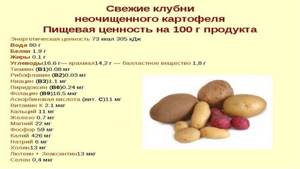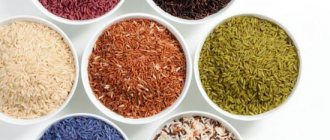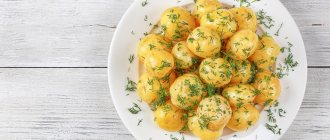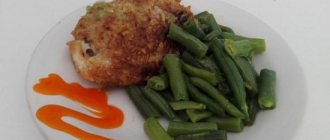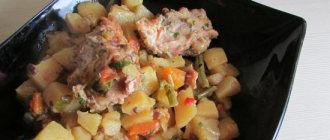Calorie content and cooking methods
If peeled and cut potatoes are soaked in cold water, some of the starch will be washed out of them. But the amount of nutrients will also decrease. During prolonged cooking, the tubers will lose up to 40% of their benefits, especially if you use aluminum or tin utensils.
The calorie content of potatoes per 100 grams is on average 77 kcal, but this figure is very dependent on the preparation and processing method. The least amount of calories with maximum benefit can be obtained if the following conditions are met:
- soak peeled potatoes for no more than 20 minutes;
- It is better to immerse the tubers in boiling water and, if possible, cook less;
- It is better to choose steaming or jacket potatoes (nutrients are concentrated closer to the skin).
Composition and nutritional value of boiled potatoes
All the beneficial properties of boiled potatoes are due to the unique chemical composition of the dish. To visualize this, it is better to indicate the composition of the product in the form of a table:
| Substance name | Content (in mcg, g, mg) |
| Vitamin B4 | 18,2 |
| Selenium | 0,3 |
| Ascorbic acid | 7,4 |
| Magnesium | 20 |
| Ash | 0,72 |
| Vitamin B9 | 9 |
| Water | 77 |
| Sodium | 5 |
| Vitamin B6 | 0,269 |
| Manganese | 0,14 |
| Calcium | 8 |
| Vitamin B2 | 0,019 |
| Sulfur | 17,1 |
| Beta carotene | 0,001 |
| Vitamin B1 | 0,098 |
| Phosphorus | 40 |
| Vitamin PP | 1,312 |
| Potassium | 328 |
| Copper | 167 |
| Vitamin E | 0,01 |
| Lutein+Zeaxanthin | 9 |
| Vitamin B5 | 0,509 |
| Iron | 0,31 |
| Alimentary fiber | 1,8 |
| Vitamin K | 2,2 |
The product also contains arginine, valine, sucrose, glucose, fructose, mono- and disaccharides, lysine, alanine and many other valuable components. But the indicated composition of boiled potatoes implies cooking without salt.
When creating a menu, many are interested in the ratio of BJU in boiled vegetables. Per 100 grams the product contains:
- proteins - 1.7 g;
- fats - 0.1 g;
- carbohydrates - 18.2 g.
Boiled potatoes are also rich in starch and fiber, which have a good effect on the gastrointestinal tract.
Calorie content of stewed and baked potatoes
The calorie content of baked potatoes is up to 90 kcal. If you leave the skin on and bake the tubers in the oven or over coals, you will saturate your body with a lot of potassium.
It is better to stew potatoes with the addition of vegetable oil, onions, garlic, and carrots. If animal fats are added, the calorie content can reach 130−140 kcal.
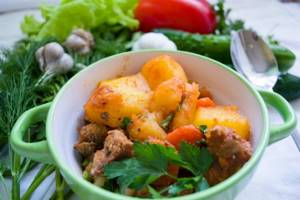
Dietary recipes for healthy eating and weight loss
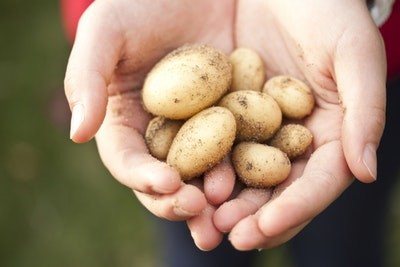
There are many recipes for potato dishes. Some of them can be safely included in the diet menu.
Baked "like fries"
You will need 3 large potatoes, spices and 1 tbsp. spoon of ground crackers. The vegetables are cut into strips, then placed in a bag and shaken together with spices and breading mixture. Then the potatoes are carefully placed on a baking sheet with parchment and placed in the oven (180°C) for 20-30 minutes.
In a slow cooker
Young potato tubers (700-800 g) are thoroughly washed, dried, pierced several times with a fork, and then wrapped in thick foil. Then the products are placed in a multicooker (up to ¾ of the volume) and baked in the “Baking” mode for 40-60 minutes. Serve potatoes cut into 2 parts with salt, herbs and a small amount of olive oil.
Calorie content of fried potatoes
Fried potatoes have the highest calorie content. Frying in vegetable oil will provide up to 200 kcal per 100 grams of product, and if you choose melted lard or cracklings - up to 230 kcal. Potato pancakes will contain about 220 kcal. French fries are the most harmful; this frying method guarantees you 305 kcal, and if the product is left in the deep fryer for a long time, it can reach 500 kcal. The same indicator is typical for potato chips.
As calculations show, 100 grams of fried potatoes can be compared with 200-300 kcal of stewed or boiled potatoes. In this case, there will be less benefits, so it is better to avoid frying altogether.
Effects on the body, benefits and harms when losing weight: why you shouldn’t get carried away
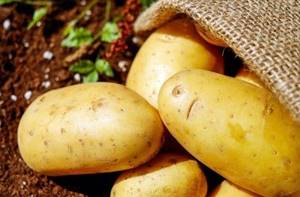
Potatoes are a unique vegetable in many respects. Even grapefruit cannot compare with it in vitamin C content. The fiber in its composition does not cause irritation to the walls of the stomach, so this type of root vegetable can be found on the menu of ulcer sufferers and gastritis sufferers.
Macro- and microelements, such as magnesium, copper, iodine and calcium, contribute to faster removal of fluid from the body, thus preventing swelling.
Plant protein guarantees a long-lasting feeling of fullness, significantly reducing the number of hunger pangs, and dietary fiber and fiber not only have a beneficial effect on the entire gastrointestinal tract system, but also remove toxins, while maintaining normal blood sugar levels.
Considering the large number of positive factors, why can’t you constantly eat potatoes and lose weight? It's all about the way you use it. Most often, potatoes are fried with vegetable or butter or even lard. No less popular are French fries with ketchup, salty chips or baked tubers in a heavy fatty sauce. In such cases, a modest 80 kcal turns into 300 or all 500.
The second disadvantage of this vegetable is its high starch content. When this substance enters the human body under the influence of insulin, it is broken down into simple sugars, which, in turn, are converted into glycogen and adipose tissue of cells. You can get rid of the latter only by combining diet with physical activity.
It is important! To reduce the calorie content of potatoes and reduce the starch content in them, before cooking, you need to fill the tubers with cold water and leave for at least 1-2 hours.
Calorie content of potato dishes
The calorie content of dumplings with potatoes is 150 kcal, but it is worth counting the dressings for the dish, for example, butter or sour cream.
Stewed potatoes with chicken and butter contain about 140 kcal, a little more in a dish with pork and vegetable oil.
100 grams of potato soup can contain only 40 kcal, if we are talking about a first course made entirely of vegetables. Potato sauces can contain at least 50 kcal depending on additional ingredients.
Julienne with potatoes and mushrooms contains at least 110 kcal.
| Potato dish or method of preparation | Calorie content per 100 g |
| Fresh potatoes | 77 kcal |
| Fresh sweet potato | 61 kcal |
| Boiled potatoes | 66 kcal - young, up to 80 kcal - old tubers |
| Boiled potatoes with dill and butter | 130 kcal |
| Mashed potatoes with butter and milk | From 105 to 140 kcal depending on the volume of additives |
| Baked potato | 90 kcal |
| Stewed potatoes with added animal fats (butter) | Up to 130−140 kcal |
| Potatoes fried in vegetable oil | 200 kcal |
| Fried in animal fats, cracklings or rendered lard | 230 kcal |
| Potato pancakes | 220 kcal |
| Stewed potatoes with chicken and butter or pork and vegetable oil | 140−150 kcal |
| French fries | 305−500 kcal depending on the time the potatoes are in the deep fryer |
| Potato chips | 500 kcal |
| Dumplings with potatoes without dressing | 150 kcal |
| Potato soup (vegetable) | 40 kcal |
| Potato sauces | About 50 kcal |
Benefits of boiled potatoes
What are the beneficial properties of this boiled root vegetable? Why is he so valuable? Even boiled potatoes contain many useful vitamins and various elements that allow you to:
- strengthen tooth enamel;
- reduce the level of fragility of blood vessels;
- activate the work of the heart;
- improve the body's protective properties;
- normalize the functioning of the thyroid gland.
Also, boiled potatoes contain a lot of calcium, which has a beneficial effect on the skeletal system and its strengthening. The product is able to remove harmful substances from the body: toxins and waste.
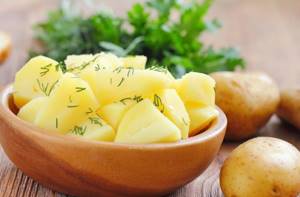
Boiled potatoes also help remove harmful cholesterol from blood vessels. The root vegetable prevents the formation of blood clots and makes blood vessels more elastic. It prevents the risk of tumors (including cancer). Boiled potatoes are suitable for some dietary systems and help cope with colds.
ABC RECOMMENDS

Potatoes raw, boiled, fried, fried, baked: calorie content per 100 g
What to eat potatoes with to avoid gaining weight
To avoid gaining weight, eat potatoes with herbs and vegetables (except tomatoes). The duet with celery root salad goes well.
Using 1 egg and 10 g of butter, you can prepare potato cutlets. Puree the ingredients, add salt, shape the mixture into an oval shape and bake in the oven.
It is recommended to add a spoonful of horseradish to regular mashed potatoes. It speeds up metabolism and stimulates the digestion process.
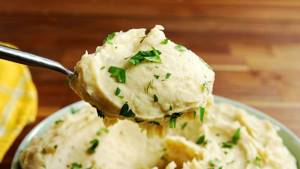
What you should absolutely not eat potatoes with
It is important to separate proteins and carbohydrates, so it is not recommended to eat potatoes with meat and fish. This combination slows down the digestive system, causes fermentation of carbohydrates, a feeling of discomfort and heaviness in the stomach.
If you are watching your figure, you should not eat potatoes with butter, lard, tomatoes and bread.
Calorie content, BJU, glycemic index
Compared to other vegetables, the calorie content of potatoes is significantly higher. This is due to the large amount of complex carbohydrates (mainly starch) in the composition:
- Raw potato tuber has 75-76 kcal per 100 g.
- The glycemic index directly depends on the method of preparing the vegetable: the highest GI in mashed potatoes is 90 units, in boiled potatoes it is 65 units.
- 100 g of product contains 3% daily protein, 0% fat, and 6% carbohydrates.
calories in potatoes - resources for weight loss
If you liked this article, try our newsletter. It's free .
Get the latest information on what works for weight loss delivered straight to your inbox. We do not share your email address. Privacy Policy
Sponsored
The tools and information on the Weight Loss Resources website are intended to help you lose weight and maintain weight and do not provide medical advice. If you have, or think you may have, a medical condition, you should consult your doctor before starting a weight loss regimen and/or physical exercise. If you decide to start exercising after a period of relative inactivity, you should start very slowly and consult your doctor if you experience any discomfort, stress or any other symptoms. If you experience discomfort or pain during exercise, do not continue. The tools and information on the Weight Loss Resources website are not intended for pregnant or breastfeeding women or persons under 18 years of age. Copyright © 2000-2020 Weight Loss Resources Ltd. All product names, trademarks, registered trademarks, service marks or registered service marks mentioned in any part of the Weight Loss Resources website are the property of their respective owners.
.
Experts' opinions
Most nutrition experts believe that potatoes can be eaten on a diet. However, this must be done correctly.
Well-known nutritionist Alexey Kovalkov, host of the “Family Size” program, does not require completely abandoning potatoes, but recommends using them correctly: only young and baked.
His colleague Mikhail Ginzburg, MD. Samara Research Institute of Dietetics also speaks about the proper use and benefits of this product. The substances contained in the vegetable not only prolong the feeling of fullness, but also nourish the muscles.
An ardent fan of organic nutrition, actress Julia Roberts also sees nothing wrong with eating potatoes. The basis of her favorite diet is this root vegetable. Her fasting diet, in addition to baked potatoes, includes fresh vegetables and low-fat cottage cheese.
Contraindications and harm of potatoes
It should be noted that the peel of the root vegetable contains solanine (a rather harmful element), which sometimes causes discomfort. However, solanine accumulates only in old peels. Especially in green tubers that have changed color under the influence of light and those potatoes that have already sprouted.
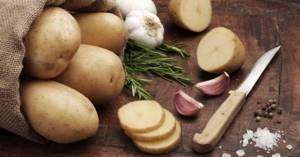
The main signs of poisoning with this substance are:
- stomach upset
- vomit
- nausea
- Strong headache
Chemical composition, microelements and vitamins in potatoes
Potatoes are a storehouse of useful substances for the human body. It is used not only in cooking, but also in medicine and cosmetology.
Potatoes contain:
- amino acids;
- vitamins (B, B2, B6, C, PP, K, E);
- protein, iodine, iron;
- calcium, magnesium, zinc;
- minerals and folic acid;
- starch, carotene.
Beneficial properties for the body
The beneficial properties of the root vegetable include:
- removing excess water from the body, preventing swelling;
- salt breakdown;
- normalization of metabolism and acidity levels in the stomach;
- prevention of heart and vascular diseases due to the high potassium content;
- lowering blood cholesterol levels;
- smoothing of fine expression wrinkles due to the presence of folic and ascorbic acid in young tubers.
